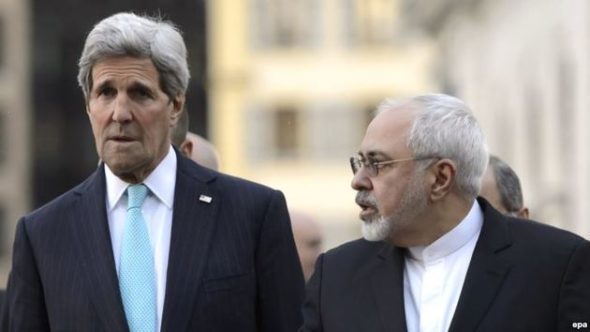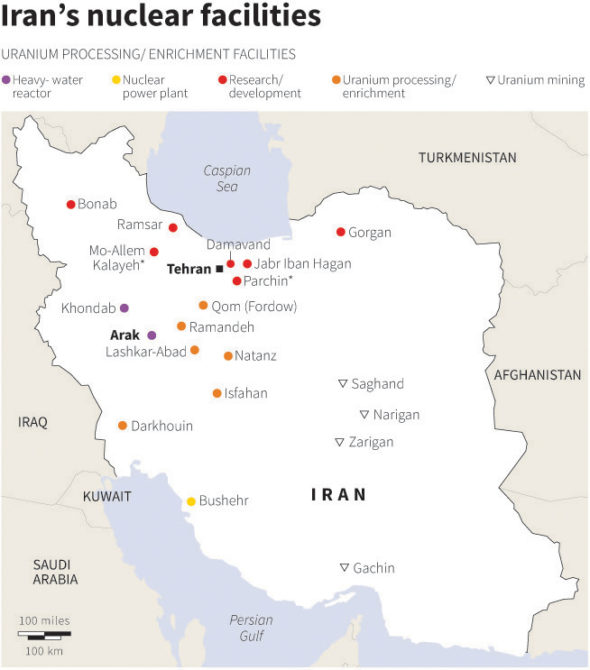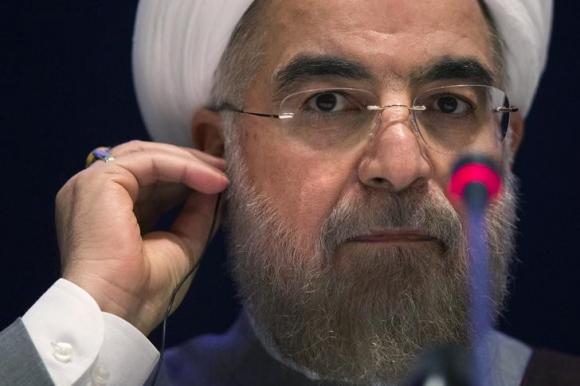U.S., Iran Explore Option of 10-Year Nuclear Freeze
Daily News Article — Posted on February 25, 2015

U.S. Secretary of State John Kerry, right, speaks with Iranian Foreign Minister Javad Zarif in Geneva on Jan. 14.
(by Laurence Norman, The Wall Street Journal) GENEVA—The U.S. and Iran are exploring a nuclear deal that would keep Tehran from amassing enough material to make a bomb for at least a decade, but could then allow it to gradually build up its capabilities again.
Such a deal would represent a significant compromise by the U.S., which had sought to restrain Tehran’s nuclear activities for as long as 20 years. Tehran has insisted on no more than a 10-year freeze.
The possible compromise on the table appears closer to Tehran’s timeline. While it would add some years in which the Iranian nuclear program continues to be closely monitored and constrained, Iran would be able to increase its capacity to enrich uranium, and thus get closer to bomb-making capability again.
Critics in Congress and in Israel quickly attacked the prospect of a 10-year time frame as inadequate.
After four days of talks in Geneva, a senior Obama administration official on Monday said there had been welcome progress toward a deal, while giving no specifics about its timeline.

The U.S. has been pushing for a freeze that would establish a period of time during which Iran would remain at least 12 months away from being able to fuel an atomic bomb—a so-called breakout period. Asked if Iran must accept that breakout period through the lifetime of an accord, the person signaled that may not be necessary.
“We have always said that we would have a one-year breakout time for a double-digit number of years and that remains the case,” the official said. That suggests a period of as little as 10 years. When pressed, the official declined to elaborate. [breakout time refers to the length of time that the Iranians would require to make a bomb were they to decide to suddenly abandon the agreement altogether and immediately resume enrichment. A year-long “break out” capacity would give the outside world a reasonable length of time to respond.]
Such a compromise could allow Iran to portray the major restrictions on its nuclear program at home as lasting only 10 years – an upper limit Iranian officials have mentioned before. Iran says its nuclear program is a purely civilian, peaceful one. [No world leaders believe this to be true.]
It also could break the impasse over how many centrifuges (machines for enriching uranium) Tehran would be allowed under a deal. If Iran can expand its activities, it could start with fewer centrifuges and then be allowed to operate more over time.
The U.S. and its global partners could argue that Tehran’s activities will remain under significant international oversight and with some constraints for much longer.
U.S. lawmakers have said they’re going to closely scrutinize any agreement with Tehran and try to force a vote in Congress on it. A deal that allows Tehran to maintain a sizable capacity to enrich uranium, and to eventually be freed to pursue a broader nuclear program, is expected to face fierce opposition.
The Obama administration maintains that it doesn’t need congressional approval for the deal because it isn’t a treaty, although Congress would have to vote to lift some of the sanctions it has imposed on Iran over the years.
Sen. Bob Corker (R., Tenn.) said in an interview that a 10-year time frame wasn’t long enough to truly curb Tehran’s nuclear ambitions.
“If you’re going to do all of this and then just end up with a 10-year agreement, you just really haven’t accomplished near what people had hoped,” said Mr. Corker, who chairs the Senate Foreign Relations Committee. Such a time frame would be “very concerning,” he added….
The Israeli government has been a leading critic of the talks, which Prime Minister Benjamin Netanyahu on Sunday warned were destined to end in a “dangerous” deal.
On Monday, Israeli Intelligence Minister Yuval Steinitz said Israel considers the negotiations “totally unsatisfactory” because it would allow Iran to be “extremely close” to a “dangerous breakout program.”

Iran’s President Hassan Rouhani listens to a question during a news conference on the sidelines of the 69th United Nations General Assembly at United Nations Headquarters in New York Sept. 26, 2014. (Photo: Reuters/Adrees Latif)
Referring to the latest suggested compromise, he said, “for a 10-year delay [in Iran’s nuclear program] you are sacrificing the future of Israel and the U.S., and the future of the world.” [The Iranian government has called for the destruction of Israel on numerous occasions. It is believed that once obtained, Iran would use nuclear weapons against Israel.]
Mr. Netanyahu will travel to Washington next week to make his case against the diplomacy. He is due to deliver a speech to Congress on March 3, at the same time U.S. and Iranian diplomats will be back in Europe seeking to advance work on a deal. The two sides are aiming to complete a framework deal by late March and have a full, detailed agreement by a June 30 deadline.
U.S. lawmakers have threatened to impose fresh sanctions on Iran if the March deadline is missed—a step that could scuttle the diplomacy. …..
Western officials said a phased structure could apply in other areas as well, such as when international sanctions on Iran will be lifted, or when Iran could resume nuclear research. Still, Western diplomats insisted that real differences remained.
The concerns about Iran’s [nuclear program] are a threat to any agreement on the enrichment issue. If Tehran is able to develop far more powerful centrifuges, Iran would be able to produce enough nuclear material for a bomb in less than a year. …
—Joshua Mitnick in Tel Aviv and Michael R. Crittenden in Washington contributed to this article.
Copyright 2015 Dow Jones & Company, Inc. All Rights Reserved. Reprinted here for educational purposes only. May not be reproduced on other websites without permission from The Wall Street Journal. Visit the website at wsj .com.
Questions
1. In negotiations with Iran over its nuclear program this week, what compromise is the U.S. considering?
2. How do critics of the Obama administration’s negotiations with Iran view this compromise?
3. Why does the Obama administration say it does not need Congressional approval to make this deal with Iran? What will it need Congress to do?
4. Why is Israel so opposed to the deal the U.S. and others are negotiating with Iran?
5. Sanctions are actions that are taken to force a country to obey international laws by limiting or stopping trade with that country, by not allowing economic aid for that country, etc. In January 2014 it was reported that the sanctions imposed on Iran by the U.S., EU and UN:
have helped to wreck Iran’s economy. In particular, the vital oil industry is on its knees. In June 2013, Iran was still the second-biggest oil producer in Opec after Saudi Arabia, pumping 3 million barrels per day. By this September, its daily production had tumbled by 400,000 barrels to 2.6 million. Given that oil prices exceed $100 per barrel, that fall represents a loss of billions of dollars. So Iran needs to compromise over its nuclear ambitions in order to ease the burden of sanctions. America and its allies, meanwhile, want to contain a nuclear program that advances month by month and would eventually give Iran the option of building the ultimate weapon.
Read the “Background” below. Then watch the interview with Foreign Policy expert Michael O’Hanlon. Iran’s secret nuclear weapons program was discovered in 2002. The U.S. and others have been negotiating with Iran on and off for 10 years.
Do you think the U.S. should make this agreement with Iran now, or continue or increase sanctions instead as a way to force Iran to completely disband its nuclear program? Explain your answer.
6. In a recent speech, former NYC Mayor Rudy Guiliani said:
So let’s review the agreement…. Iran wants, it says, the peaceful use of nuclear power. Iran has 300 years of natural gas and oil reserves and they haven’t started fracking or hydraulic drilling yet. They may have 1000 years of reserves…. Iran does not need a nuclear power plant for power. They got plenty of energy, plenty of energy to export to the rest of the world. There is no reason in the world for them to have the peaceful use of nuclear power. Maybe France needs it. Maybe countries without natural resources need it, but Iran doesn’t need it. So why have they been doing this? They’ve been doing this because they want to become a nuclear power. Not only that, they have written that, they have said that, they have described that. The president reformer who runs Iran, Rouhani, in ’03 and ’05 continued to enrich uranium while they had a standstill agreement with us. He did it secretly and bragged about it, and we’re negotiating with them. This is like playing poker with a guy who cheated you twice before. You know who does that? A moron. An agreement with Iran with regard to nuclear power should be very simple. Iran should not be allowed to have any form of nuclear power.
Most of us, maybe not all of us in this room, went through the Cold War. Those of us in the Reagan administration certainly remember it. General Shelton fought it, the Cold War, because it wasn’t always a cold war. And the big fear during the Cold War was that a madman would come along and be able to get his finger on the button in the U.S. or Russia, and all of a sudden we could destroy the world. We saw movies about that, we saw Broadway plays about that, we saw comedies about that, and we read books about that. And we were afraid of that. And it never happened, thank God. These people in Iran, the Ayatollah and the mullahs, have already told us they are insane. They have already described to us in words and deeds the actions of insane people. I didn’t say irrational, I said insane. I believe the Ayatollah is truly insane. He lives in a different world than the real world in which we live, which is probably the best definition of insanity you can have. He’s like the guy walking around Bellevue Hospital thinking he’s George Washington. He’s a madman. He’s announced that he wants to destroy the state of Israel.
And we are upset that Prime Minister Netanyahu wants to come here and defend his country? When someone who is a few hundred miles away [from Israel] wants nuclear weapons and has threatened to destroy his country of six or seven million people? It’s smaller than New York City. …
a) Do you agree with Mayor Guiliani’s assertion that “Iran should not be allowed to have any form of nuclear power”? Explain your answer.
b) Ask a parent and a grandparent the same question.
Background
ON URANIUM ENRICHMENT:
Enriched uranium is a critical component for both civil nuclear power generation and military nuclear weapons. The UN’s International Atomic Energy Agency attempts to monitor and control enriched uranium supplies and processes in its efforts to ensure nuclear power generation safety and curb nuclear weapons proliferation (buildup).
IRAN’S NUCLEAR PROGRAM:
- Iran’s 20 year secret nuclear program was discovered in 2002. Iran says its program is for fuel purposes only, but it has been working on uranium enrichment which is used to make nuclear bombs. [NOTE ON URANIUM ENRICHMENT: Enriched uranium is a critical component for both civil nuclear power generation and military nuclear weapons. The International Atomic Energy Agency attempts to monitor and control enriched uranium supplies and processes in its efforts to ensure nuclear power generation safety and curb nuclear weapons proliferation (buildup).]
- Under the United Nations’ NPT (Non Proliferation Treaty) countries are not allowed to make nuclear weapons (except for the 5 that had nuclear weapons prior to the treaty – the U.S., Russia, China, France, the United Kingdom).
- Safeguards are used to verify compliance with the Treaty through inspections conducted by the UN’s nuclear watchdog, the IAEA (International Atomic Energy Agency).
- The IAEA has consistently stated it is unable to conclude that Iran’s nuclear program is entirely peaceful.
- The IAEA issued a report on Sept. 15, 2008 that said Iran has repeatedly blocked an investigation into its nuclear program and the probe is now deadlocked.
- The U.N. Security Council has already imposed four sets of sanctions on Iran over its nuclear defiance. Despite the sanctions, Iran has refused to end its nuclear program.
- A group of U.S. and Russian scientists said in a report issued in May 2009 that Iran could produce a simple nuclear device in one to three years and a nuclear warhead in another five years after that. The study, published by the nonpartisan EastWest Institute, also said Iran is making advances in rocket technology and could develop a ballistic missile capable of firing a 2,200-pound nuclear warhead up to 1,200 miles “in perhaps six to eight years.”
- The Iranian government has called for the destruction of Israel on numerous occasions. It is believed that once obtained, Iranian President Ahmadinejad would use nuclear weapons against Israel.
